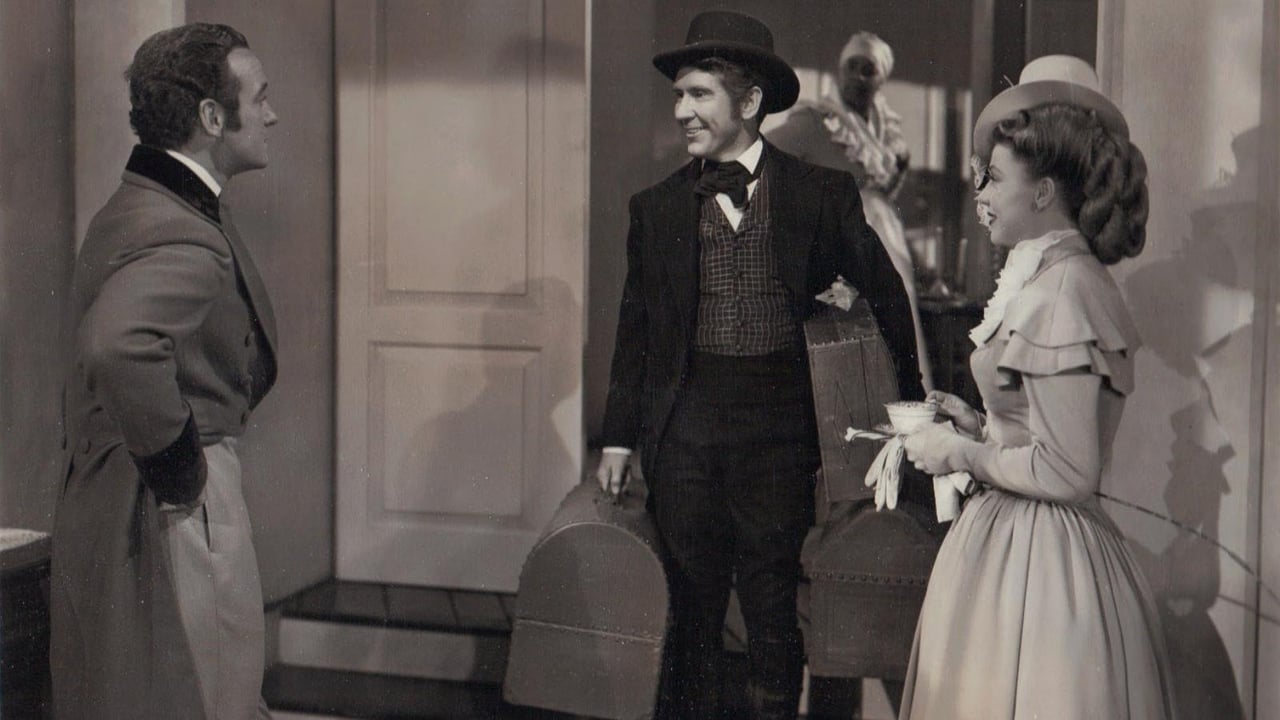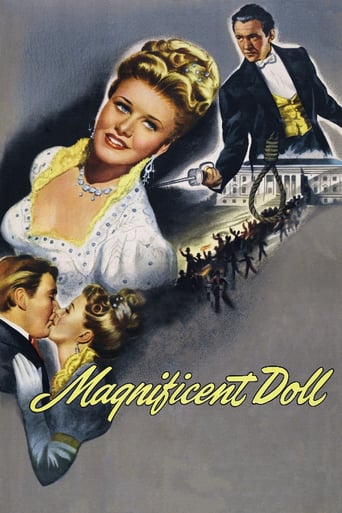



Best movie ever!
The first must-see film of the year.
By the time the dramatic fireworks start popping off, each one feels earned.
View MoreThere is, somehow, an interesting story here, as well as some good acting. There are also some good scenes
View MoreRecently I moved and as I was doing so, I threw some films into a few boxes I wanted to watch but never got around to watching for one reason or another. A few days ago, while unpacking some items, I found one of the boxes-- a treasure trove is more accurate-- and inside was a copy of MAGNIFICENT DOLL.I have had a copy of this film for several years and I was saving it-- who knows why. And what a treat to save. I love this film and only wish I had seen it ages ago. Just look at the cast of this historical drama.David Niven and Ginger Rogers are top-billed. And altogether, they appeared in three films-- MAGNIFICENT DOLL was the second pairing for them. Their other efforts were BACHELOR MOTHER (for RKO) and OH MEN! OH WOMEN! (for Fox). One of the things I love about this film is that it's the second time Burgess Meredith gets the girl in a Ginger Rogers movie. Previously, he was the lucky guy in TOM, DICK AND HARRY. So though Niven is higher billed, he is essentially playing a supporting role, because Meredith is the one holding Rogers in his arms as the final fade-out occurs. MAGNIFICENT DOLL was a flop, probably because Universal didn't know how to market it and audiences were not ready to see Ginger do anything but musical comedy or tearjerkers. But watching this film convinces me that she was at her best when she was working in other genres, pushing herself as an actress. The set decoration is top-notch in this film; and Ginger gets to wear gowns by Vera West and hats by Lilly Dache.The always exceptional Frank Borzage is the director and rabbi turned Hollywood executive Jack Skirball is the producer.
View MoreTwenty years before playing matchmaker Dolly Levi, Ginger Rogers played a real-life Dolly, the famous Washington hostess who eventually became first lady and the name on a donut box. She's a feisty young lady whose father promised her hand in marriage to a man she didn't love, and after a marriage where she doesn't utter "I love you" until its too late, she finds herself involved with two rising politicians, both on opposite sides of the spectrum in government. Aaron Burr (David Niven) is handsome and charming, but his ambitions go far beyond the ideals of early American freedom. James Madison (Burgess Meredith), "the father of the constitution", is quiet and idealistic, even though he quietly manipulates Burr into an introduction to the lovely Dolly. As she learns the truth about each man, her feelings towards both of them change, even though her loyalty towards a traitorous one remains as far as praying that they will see the error of their ways. But evil ambitions rarely change, and Dolly will have to make a drastic decision based upon her own conscience rather than what lies deep in her heart.If you get past the casting of Ginger Rogers as Dolly Madison, you've won half the battle. She's much more attractive than the real Dolly, but that's Hollywood for you. Another issue is the fact that Ms. Rogers didn't play any other period roles than this one, so her acting may make the character seem a lot more modern than the colonial days this was set in. Getting past all that, she's very sincere in her portrayal and makes Dolly a vibrant force to be reckoned with. Meredith's James Madison is played with quiet dignity, while Niven's Aaron Burr is a force of nature, and one to be reckoned with. Probably the only time Niven ever played a villain, it seems like a role more likely for someone like Vincent Price or George Sanders, but it is a nice switch to see someone as dashing as Niven playing somebody totally despicable.As the devoted first husband longing to hear the words "I love you", Stephen McNally is very effective and Rogers believably allows her feelings to change from hatred to admiration and later on an unspoken love. If this doesn't really reflect who the true Dolly Madison was, it at least gives the viewer a chance to see what life may have been like at the time and to see Rogers in a different type of role than they are used to. The real power of the drama is in watching Niven's Burr literally go mad with his desire for power and how he is ultimately destroyed by it. Rogers is powerful in her final scene where she begs a mob out to hang Burr not to do so otherwise make him a martyr. The scene is obvious fiction as is the speculation of a romantic connection between Dolly and Aaron, so on that level, this isn't a historical document but a speculation by the writers. It is still enjoyable on a fictional level utilizing real life historical events to cap its story around legend.
View MoreIt's considered polite to consider Borzage's post -war movies mediocre,which is completely unfair.Although they cannot match the director's 1927-1940 brilliant production (who can anyway?),some of them are acceptable,and some even highly commendable:such is the case of " I've always loved you" (1946) or "moonrise" (1948)."The Spanish main" (1945) although hailed by some as a pirates classic ,fails to excite ,perhaps because it is an impersonal movie."Magnificent doll" blends love stories with political subjects .David Niven ,cast against type ,plays the part of the villain,a politician who won't be satisfied till he owns everything .Ginger Rogers is good,but her character is a bit unbelievable.In fact,at least to my eyes,only the first part is Borzagesque: Dolly's first husband is the good man we meet in many of his movies,the one ready to give it all ,to sacrifice everything,even his own happiness if the woman he loves is happy ;that was the story of the heroes/heroines of "street angel" "lucky star" "green light" "big city" ....
View MoreExcept for those Vice Presidents who ended up as President (14 of them)only one is remembered as a distinct personality: Aaron Burr. And it is for some questionable reasons. His ambitions were on the scale of Napoleon Bonaparte, aimed (supposedly) not only towards the U.S. but also Mexico, and against Spain (and supposedly willing to use French or British assistance). He managed to show that Thomas Jefferson, for all his brilliance as party leader and politician, could be momentarily thrown for a loop by a clever, unforeseen loophole. He helped destroy Alexander Hamilton's political career, and then ended Hamilton as well. And, despite facing political ruin, he managed to leave his political chief's political projects in ruins. To 90% of the American public, mention Burr and the word "traitor" or "unscrupulous" pops up.There are those who deny this view of Burr. Jefferson and Hamilton were grown men, who played hard ball politics with each other and with each other's supporters. Burr was no different from them. Jefferson was willing, as John Adams' Vice President, to forget his old friendship with Adams and concentrate on derailing his chief's policies and aims (as Burr did towards Jefferson). Hamilton hit Burr pretty well in the New York Gubernatorial race of 1804, helping to defeat Burr in that election (and in the process so insulting Burr as to lead to Burr's challenge and their duel in Weehauken). As for the treason against the U.S., it is now questioned if Burr was really planning to overturn U.S. government control over the western states, or just jumping the gun on westward expansion (Burr died in 1836, and lived long enough to see the fall of the Alamo and the creation of the Texas Republic - he made some sharp and cutting comments that one age's treason was another age's patriotism, which seems well called for). But in any case, Hamilton had played around with similar expeditions in Latin America in the late 1790s. But he never went as far as Burr did, involving the ranking general of the U.S. Army as a co-conspirator. So Hamilton's actions are forgotten today but Burr's actions are not.One day a creative script on Burr's career will be created, and a Scorsese director will handle it. Until then, the only film dealing with Burr's career (aside from a television version of "The Man Without a Country" made in the 1970s)is this odd little film that concentrates on the career of Dolly Payne Todd Madison, the wife of the "father of the Constitution", our 4th President James Madison. Ginger Rogers and Burgess Meredith play the Madisons (and give good performances), but the film is stolen by David Niven. Niven's darker side was rarely noticed in his climb to stardom, but when he played a figure with frailties (the Major in "Seperate Tables", or the scoundrelly heir in "Tonight's the Night") he actually gave his best performances. Here he played Burr as the ambitious politico who nearly stole the 1800 election from Tom Jefferson (but for Alex Hamilton's action to keep enough Federalists from supporting Burr), and as Hamilton's slayer turned into super traitor - who got acquitted in the treason trial of 1807 (the film does not show how poor the government's case against Burr really was). Unrepentent at the end, he manages to maintain our fascination, although the audience feels it was a blessing that he failed in the end. In reality, given his commitment to immigrants, abolitionism, and feminist rights (which neither Adams, Jefferson, nor Hamilton were fully committed to), one wonders if it would have been such a bad thing had he become President in 1800.
View More